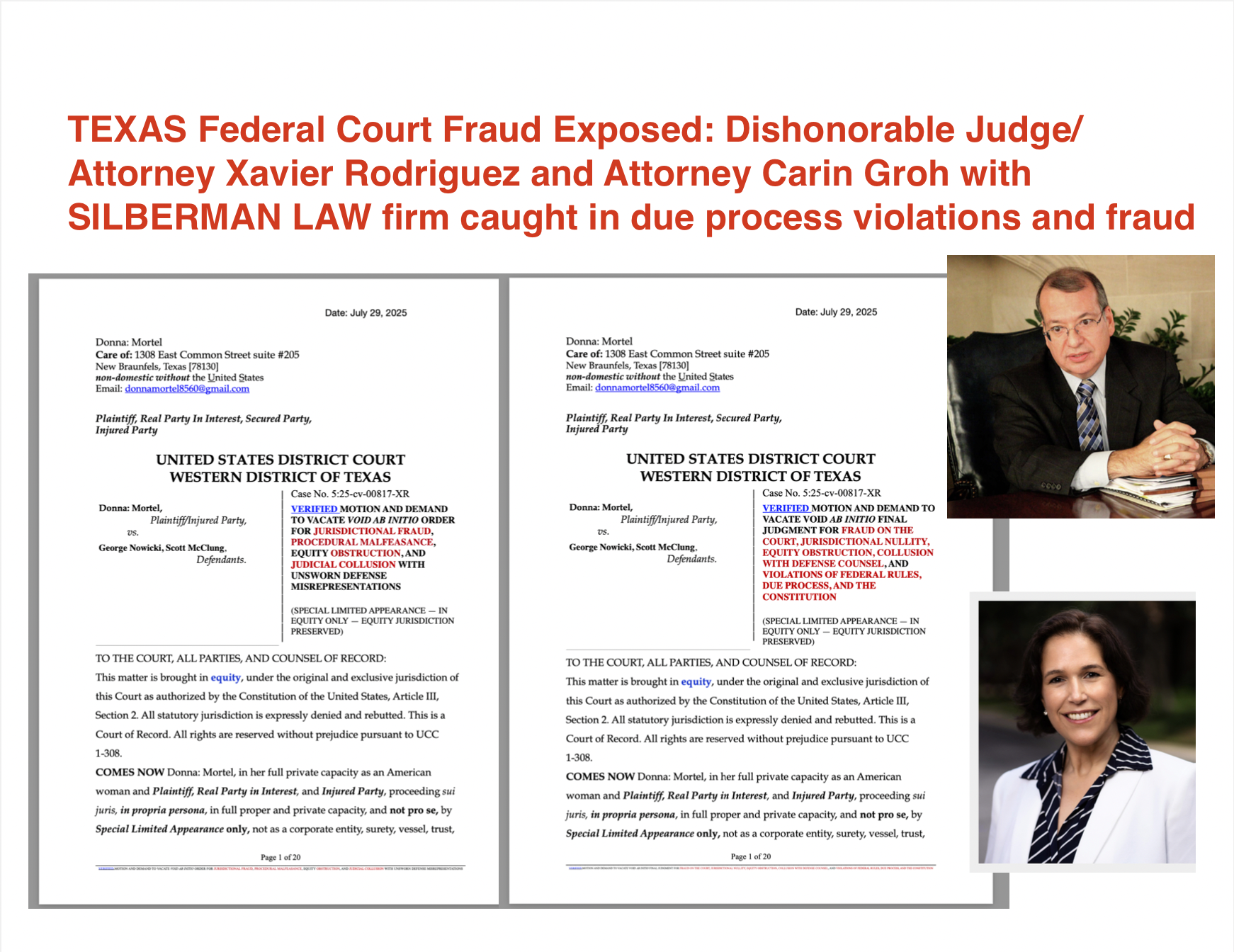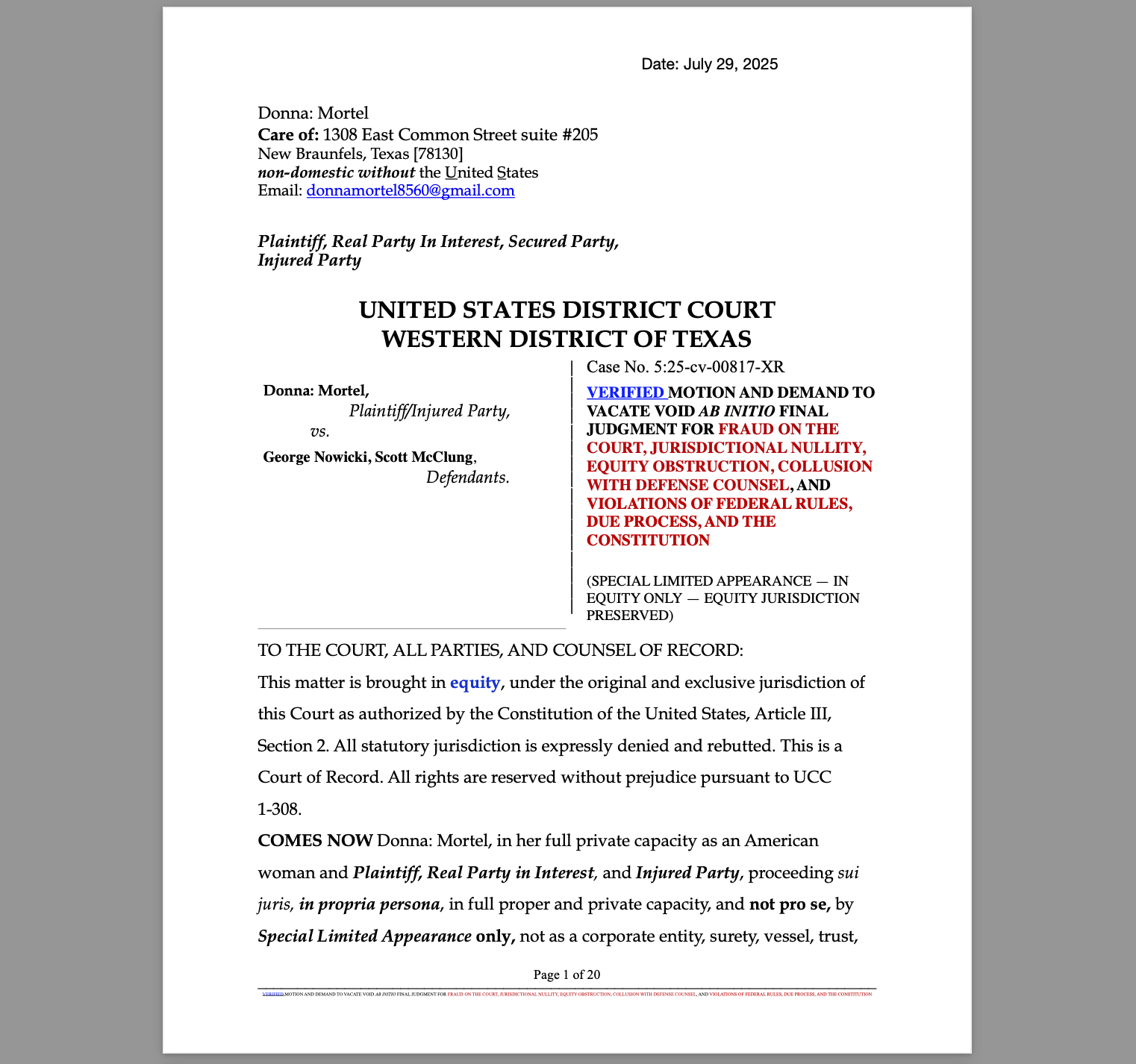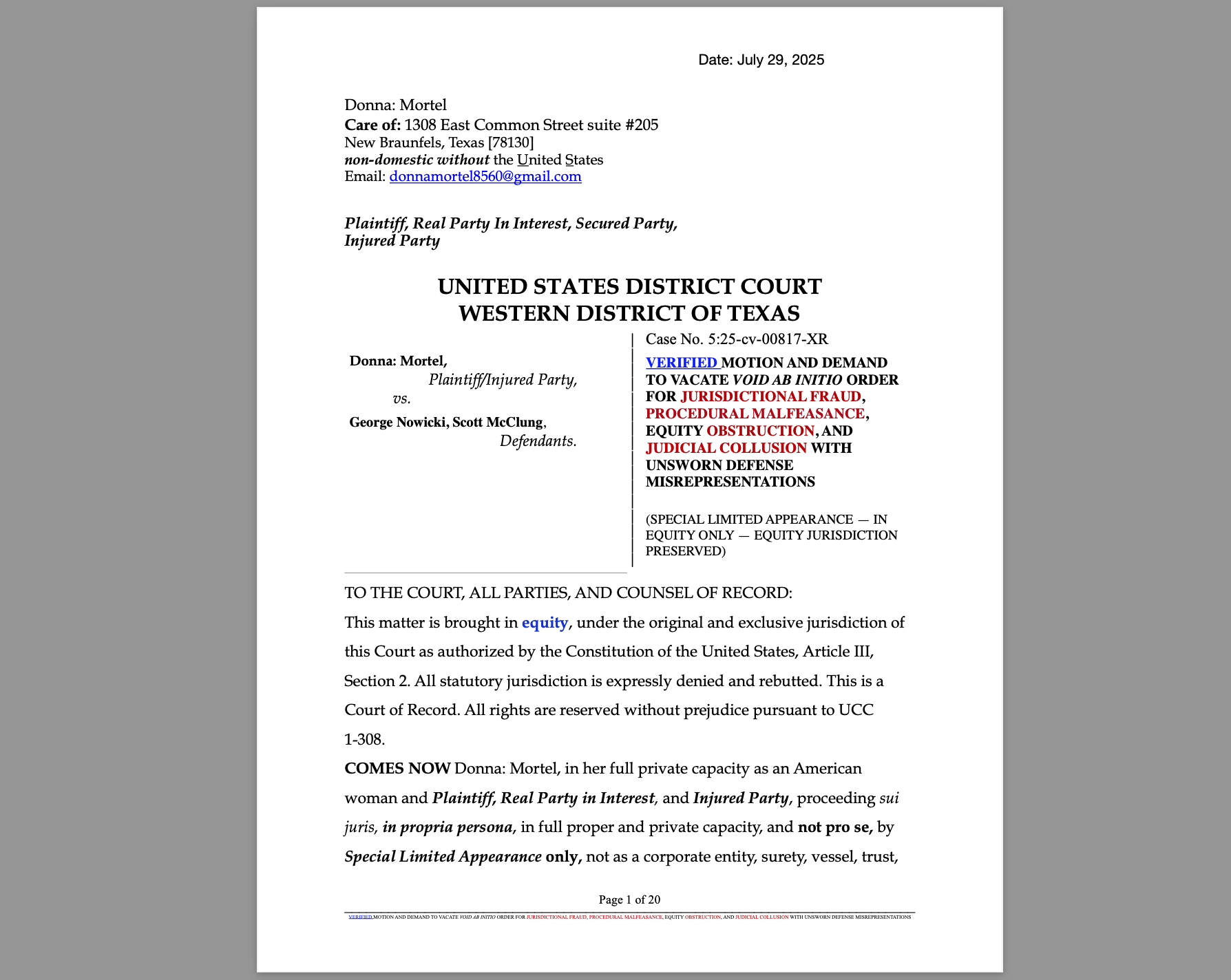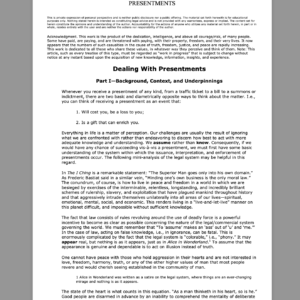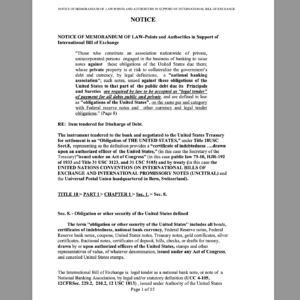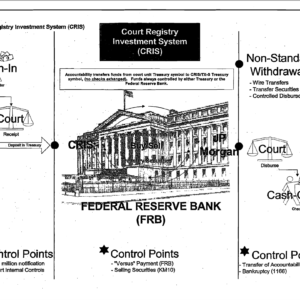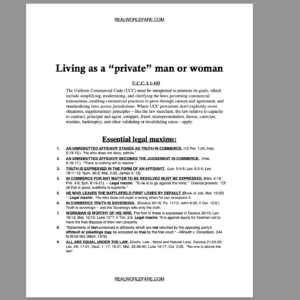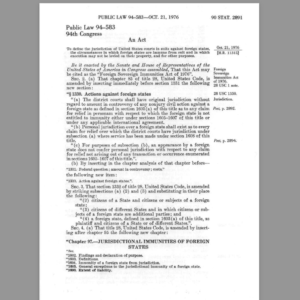In an egregious and publicly documented act of judicial malfeasance and deliberate procedural fraud, United States District Judge Xavier Rodriguez of the Western District of Texas entered a facially void Final Judgment in a pending civil rights and equity action—without adjudicating subject-matter jurisdiction, as required under Rule 12(b)(1), and in direct defiance of constitutional mandates. The record reflects undisputed substituted service, multiple verified and unrebutted affidavits, and a pending Verified Motion for Summary Judgment—all of which were maliciously ignored.
Instead, the Court improperly relied upon an unsigned, unsworn, and procedurally defective motion to dismiss authored by Carin Groh, acting as defense counsel for Steven McClung and George Nowicki—despite the fact that Defendants expressly acknowledged receipt of the service affidavit, and its binding terms, in their own filings. Such conduct constitutes textbook fraud on the court, a willful obstruction of due process, and a blatant violation of Federal Rule of Civil Procedure 60(b)(4), which mandates vacatur of judgments entered without jurisdiction or in violation of due process.
The clause in the binding affidavit stipulated:
XIII. NOTICE AND CONSENT TO SERVICE OF PROCESS BY USPS OR EMAIL/ELECTRONIC MAIL
- The Landlords/Owners/Agents, by virtue of entering into a legally binding lease agreement with the undersigned and engaging in ongoing commercial communications, are hereby given lawful notice that service of any future private process, communication, lawsuit, summons, or civil process may be effectuated through:
- USPS Certified Mail, return receipt requested, addressed to the last known mailing address(es) provided or used by the Landlords/Owners/Agents;
- Email service, sent to any known and previously used address(es) for correspondence, including but not limited to:
- xxxxxxxxxxxxxxxxx, xxxxxxxxxxxxxxxx
- This clause is consistent with:
- Texas Rule of Civil Procedure 106(b)(2) — which authorizes substituted service, including by mail or electronic means, when personal service is impracticable and where parties have demonstrated a pattern of conduct establishing communication through such means;
- Federal Rules of Civil Procedure Rule 4(f)(3) — permitting court-approved service by alternate means including email for parties out of state or in a different jurisdiction;
- UCC § 1-202 / Texas Bus. & Com. Code § 1.202 — defining notice and knowledge, including actual notice or reason to know under commercial circumstances.
- Given the parties’ pre-existing contractual relationship, email and/or USPS constitute reasonably calculated means of service and satisfy both constitutional due process and commercial standards of notice.
- Absent an express written objection to this method of service, received within three (3) days of this notice, the Landlords/Owners/Agents shall be deemed to have consented to substituted service for any civil action, including but not limited to lawsuits for damages, lien enforcement, or equitable relief.
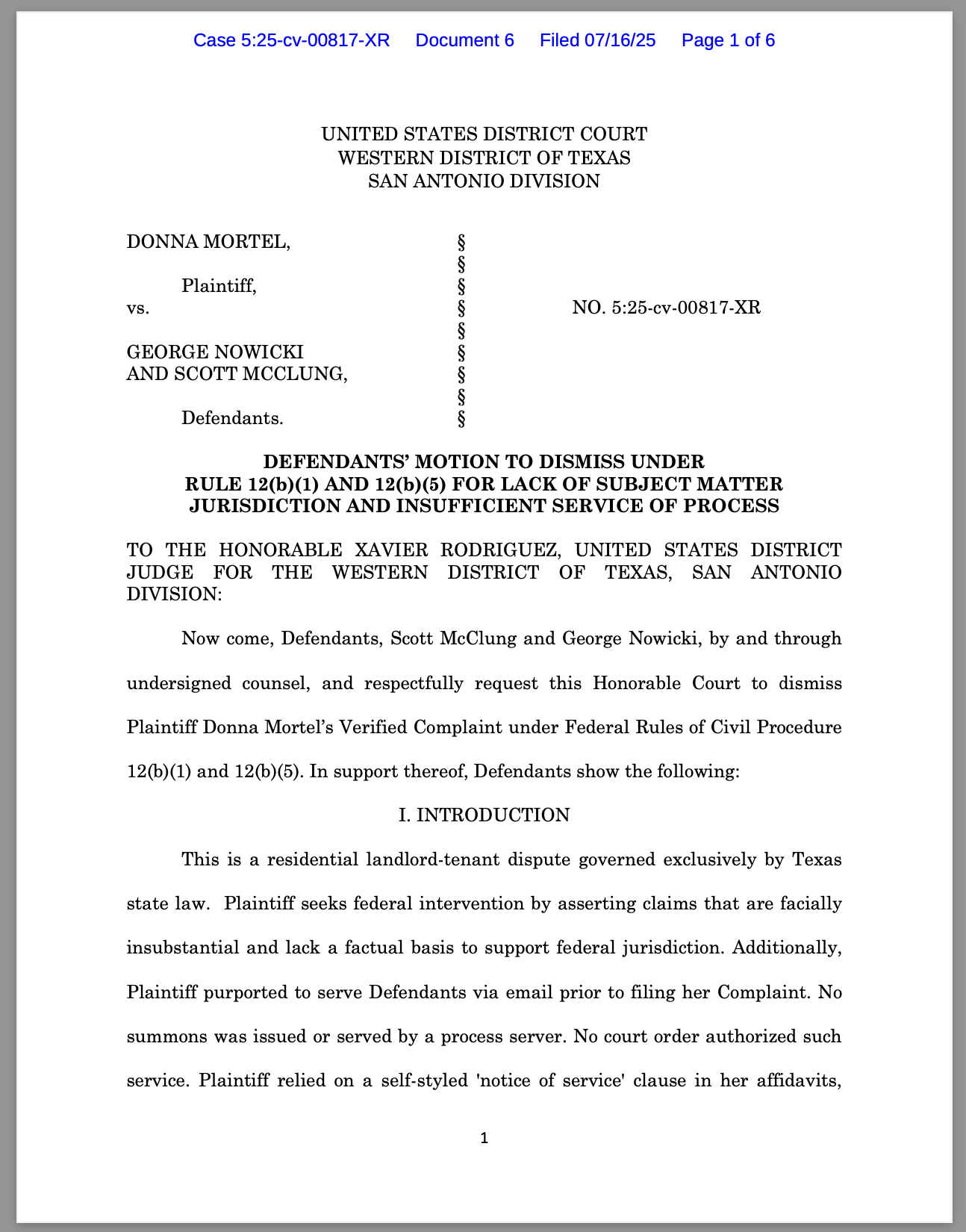
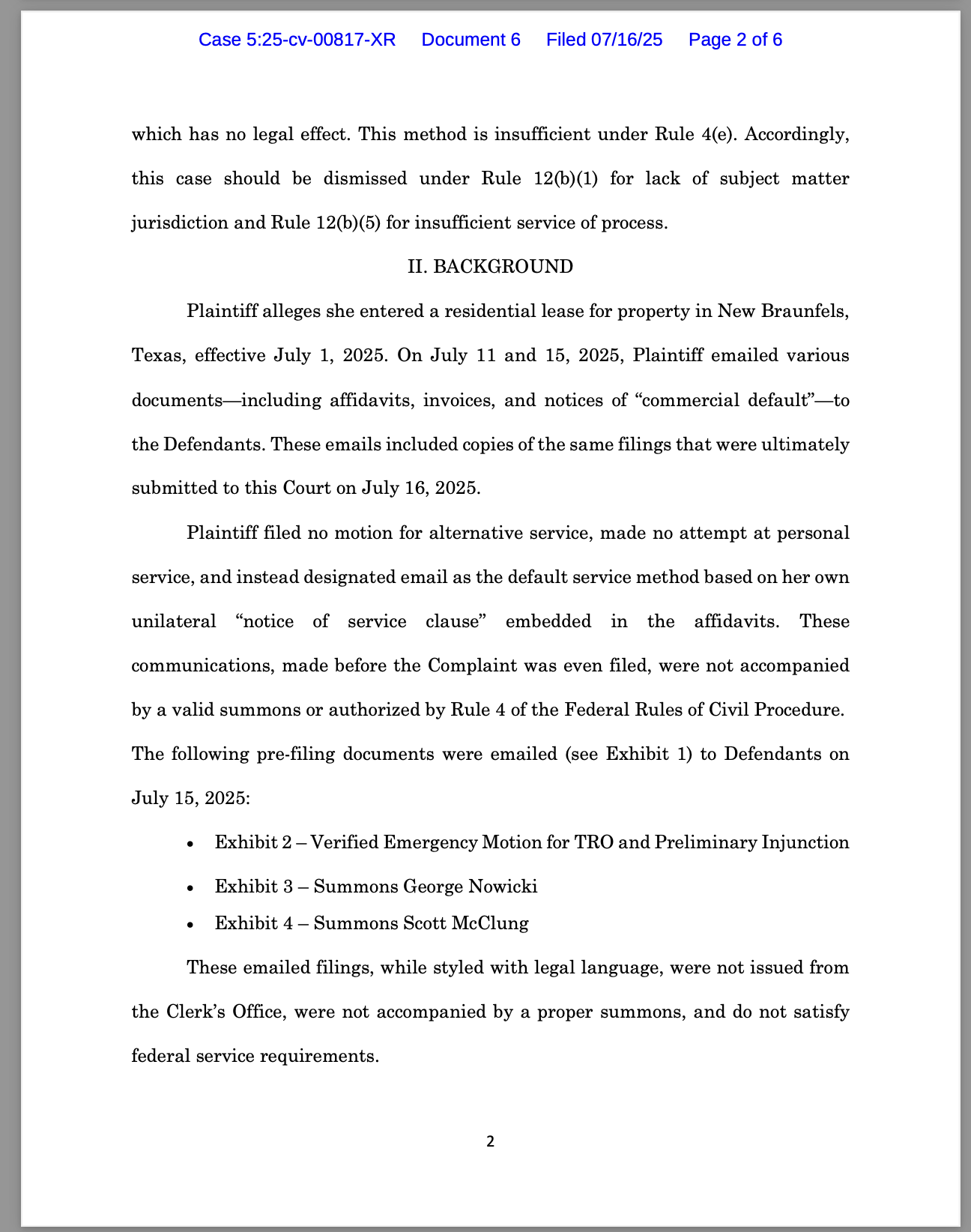
This is not mere judicial error—it is a deliberate collusion to subvert lawful proceedings, suppress equity, and protect corporate defendants through procedural manipulation. Under binding Supreme Court and Fifth Circuit precedent, a judgment rendered in the absence of jurisdiction is void ab initio, a legal nullity, and must be set aside as a matter of law and ethical duty. This incident stands as a clear violation of the Separation of Powers, Article III, and the Due Process Clause of the Fifth Amendment, demanding immediate federal review and disciplinary action.
THE FACTS:
Plaintiff filed no less than fifteen (15) verified filings on the public record, including a Verified Motion for Summary Judgment supported by sworn commercial affidavits, unrebutted material facts, and documentary evidence establishing default, dishonor, and legal standing. These filings triggered mandatory adjudication under Federal Rule of Civil Procedure 56(c) and constitutional due process.
Defendants never filed any sworn rebuttal, nor denied receipt of service. In fact, defense counsel Carin Groh, of Silberman Law Firm, PLLC, explicitly acknowledged receipt of the Plaintiff’s affidavit of service and admitted in her own defective filing that the Defendants were served by email pursuant to a contractual service clause within the affidavit. That clause constitutes a valid and binding private agreement, enforceable under Article I, Section 10 of the United States Constitution, which bars courts and states from impairing the obligation of contracts.
Despite this incontrovertible record, Judge Xavier Rodriguez:
-
Ignored all unrebutted affidavits and pending motions;
-
Refused to adjudicate subject-matter jurisdiction under Rule 12(b)(1), declaring it “MOOT” in defiance of binding precedent;
-
Relied exclusively on an unsworn, unsigned, and procedurally void motion to dismiss filed by Carin Groh—rendered inadmissible under FRCP 11 and 12;
-
Fabricated a dismissal under Rule 41(b) for “failure to prosecute,” despite the docket proving vigorous prosecution and verified filings;
-
Entered a Final Judgment on July 29, 2025, without addressing a single verified motion or affidavit, and without issuing findings of fact or conclusions of law;
-
Allowed the minute entry for the July 29 hearing to be hidden from public view, further undermining transparency and suggesting deliberate concealment.
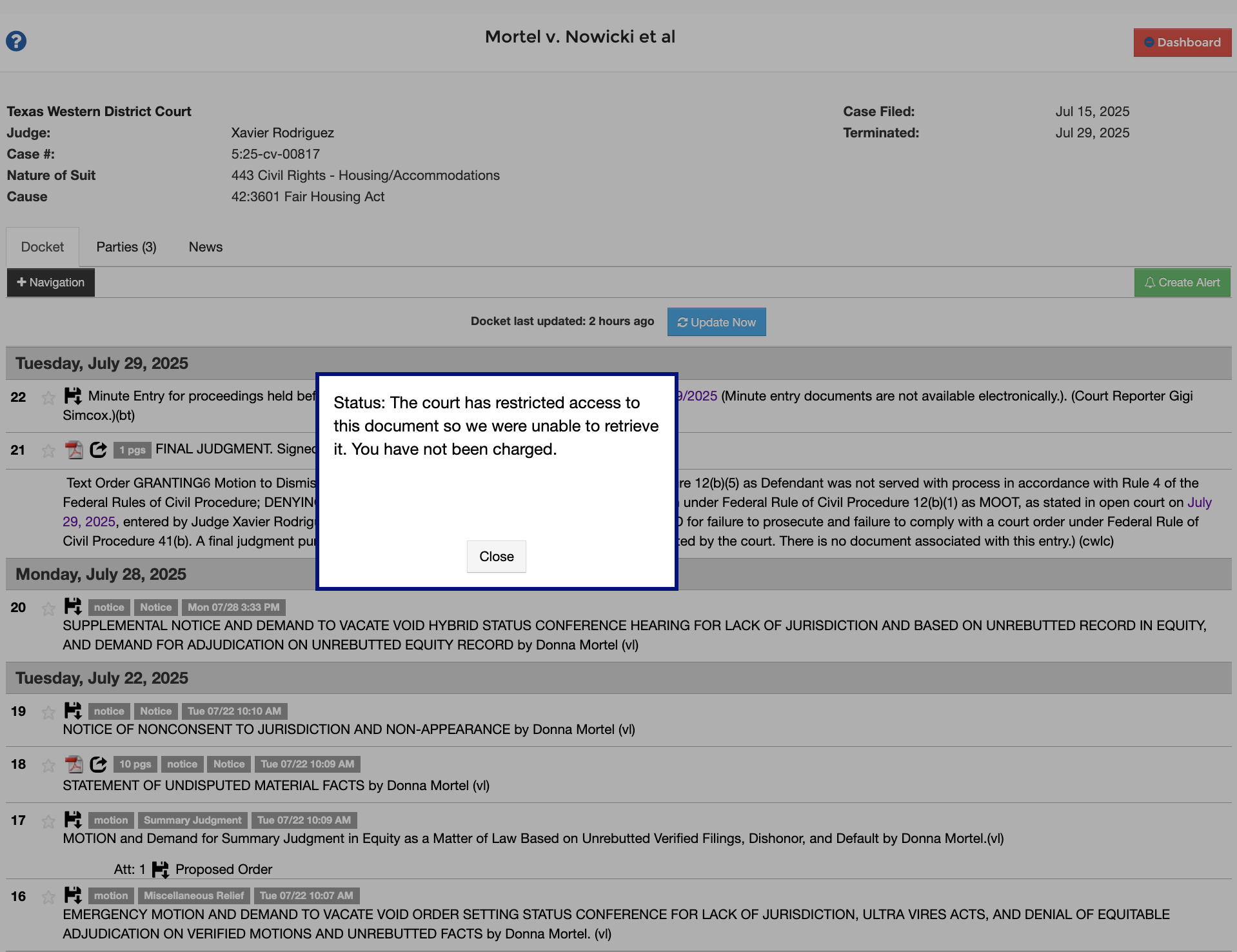
This is not legal error—it is judicial fraud, procedural sabotage, and a deliberate conspiracy to obstruct equity jurisdiction and shield the Defendants from lawful adjudication. Every act taken by Judge Rodriguez post-jurisdictional default is ultra vires, and the Final Judgment is void ab initio under Rule 60(b)(4) and controlling Fifth Circuit precedent.
THE LEGAL REALITY:
The law is not ambiguous. The United States Court of Appeals for the Fifth Circuit has clearly and repeatedly held that void judgments, fabricated dismissals, and collusive disregard of procedural mandates are grounds for mandatory vacatur — not discretionary review.
“When a judgment is void under Rule 60(b)(4), the court has no discretion and must set it aside.”
— Callon Petroleum Co. v. Frontier Ins. Co., 351 F.3d 204, 208 (5th Cir. 2003)
“Dismissal under Rule 41(b) is appropriate only where there is a clear record of delay or contumacious conduct by the plaintiff.”
— Berry v. CIGNA/RSI-CIGNA, 975 F.2d 1188, 1191 (5th Cir. 1992)
“A party may waive service objections by failing to raise them or by voluntarily accepting alternative service.”
— Peterson v. BMI Refractories, 124 F.3d 1386, 1391 (5th Cir. 1997)
Yet here, no valid service objection existed — Defendants received the Complaint, acknowledged the Affidavit of Service, and proceeded to litigate without ever moving to quash or contest service.
No record of delay or contumacious conduct exists — Plaintiff submitted ten verified filings, including a motion for summary judgment and affidavits that were never addressed.
No subject-matter jurisdiction was ever adjudicated, despite Plaintiff’s Rule 12(b)(1) motion and express objection on the record.
And still — a Final Judgment was fraudulently entered, based solely on an unsigned, unsworn, procedurally barred motion filed by Carin Silberman, acting under color of law and in clear collusion with Judge Xavier Rodriguez.
This is not a close call. This is legal nullity, judicial malfeasance, and fraud upon the court, in direct violation of controlling Fifth Circuit precedent, the Constitution, and the fundamental right to due process.
WHAT THIS IS: JUDICIAL COLLUSION AND ABUSE OF POWER
This is not mere judicial error — it is deliberate and coordinated fraud upon the court.
Judge Xavier Rodriguez of the Western District of Texas engaged in an unlawful and ultra vires dismissal of a properly filed federal civil rights and equity case, in collusion with defense counsel Carin Groh of The Silberman Law Firm, PLLC. The Court willfully ignored verified pleadings, refused to adjudicate subject-matter jurisdiction under Rule 12(b)(1), and granted a fraudulent dismissal based solely on an unsworn, procedurally void motion submitted by defense counsel.
This was not a neutral act of judicial discretion. This was weaponized procedure and a calculated obstruction of lawful remedy. The Court refused to perform its mandatory jurisdictional duties, fabricated a “failure to prosecute” under Rule 41(b) despite fifteen (15) verified filings by Plaintiff, and imposed a fraudulent Final Judgment in total disregard of Fifth Circuit precedent and the Federal Rules of Civil Procedure.
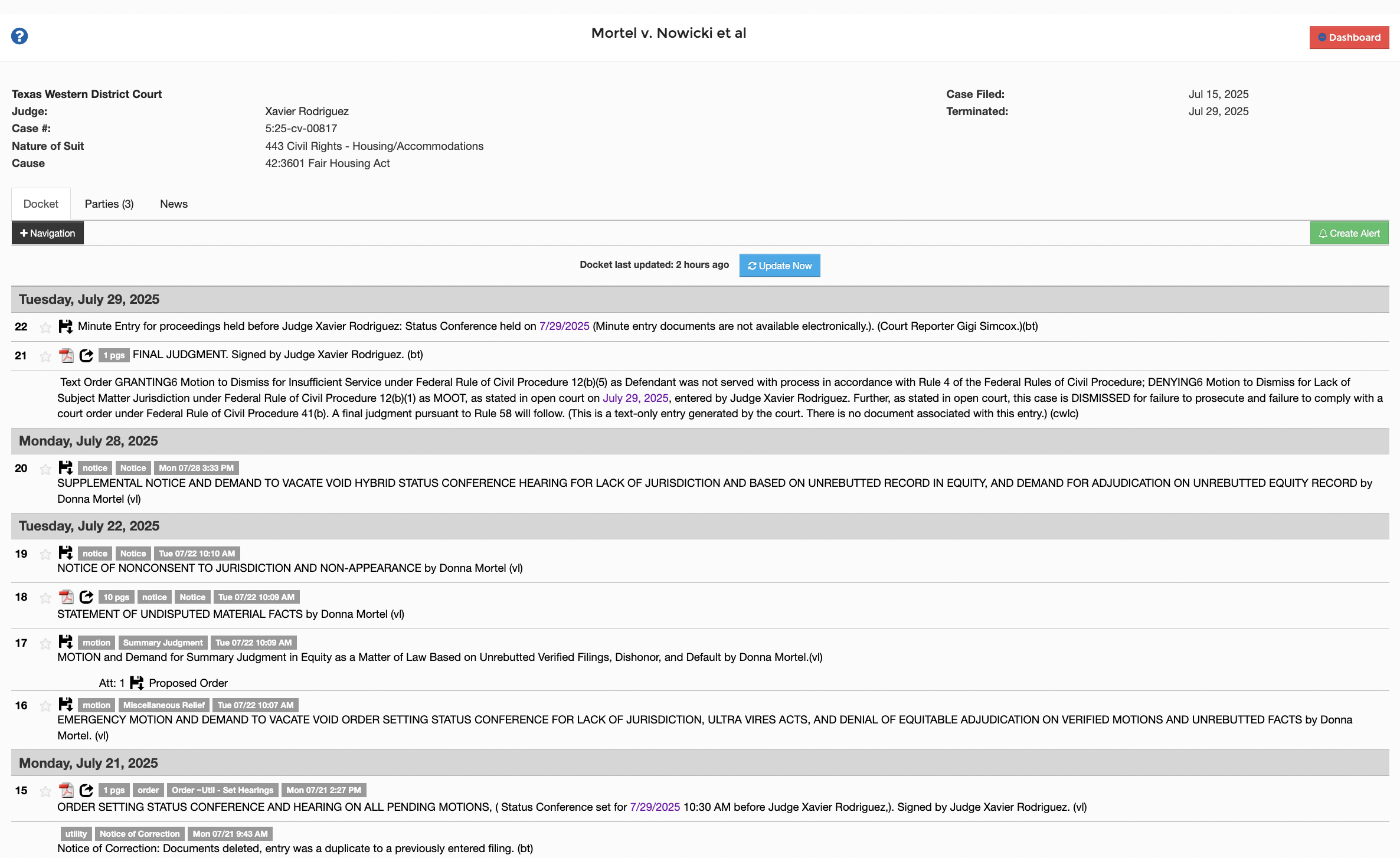
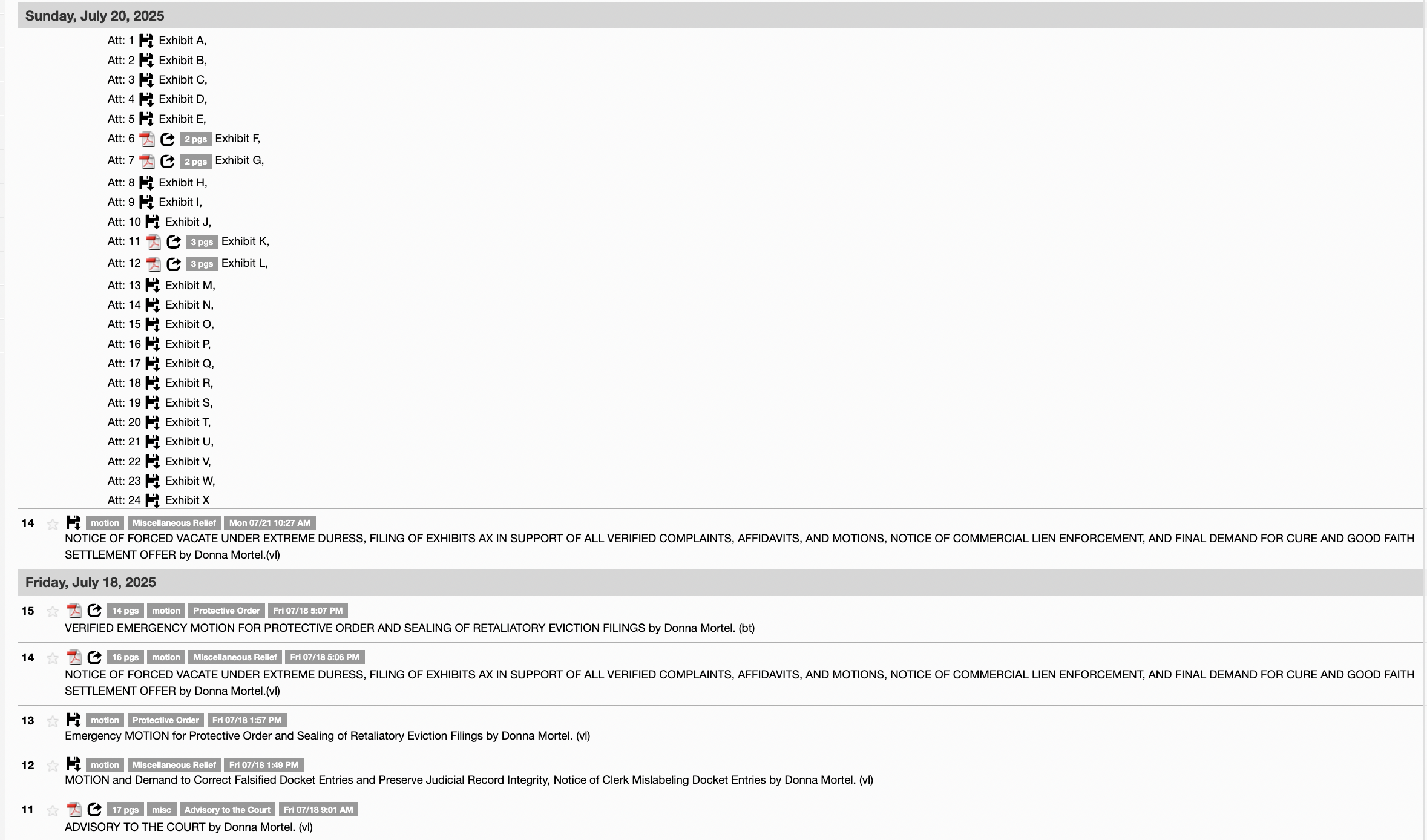
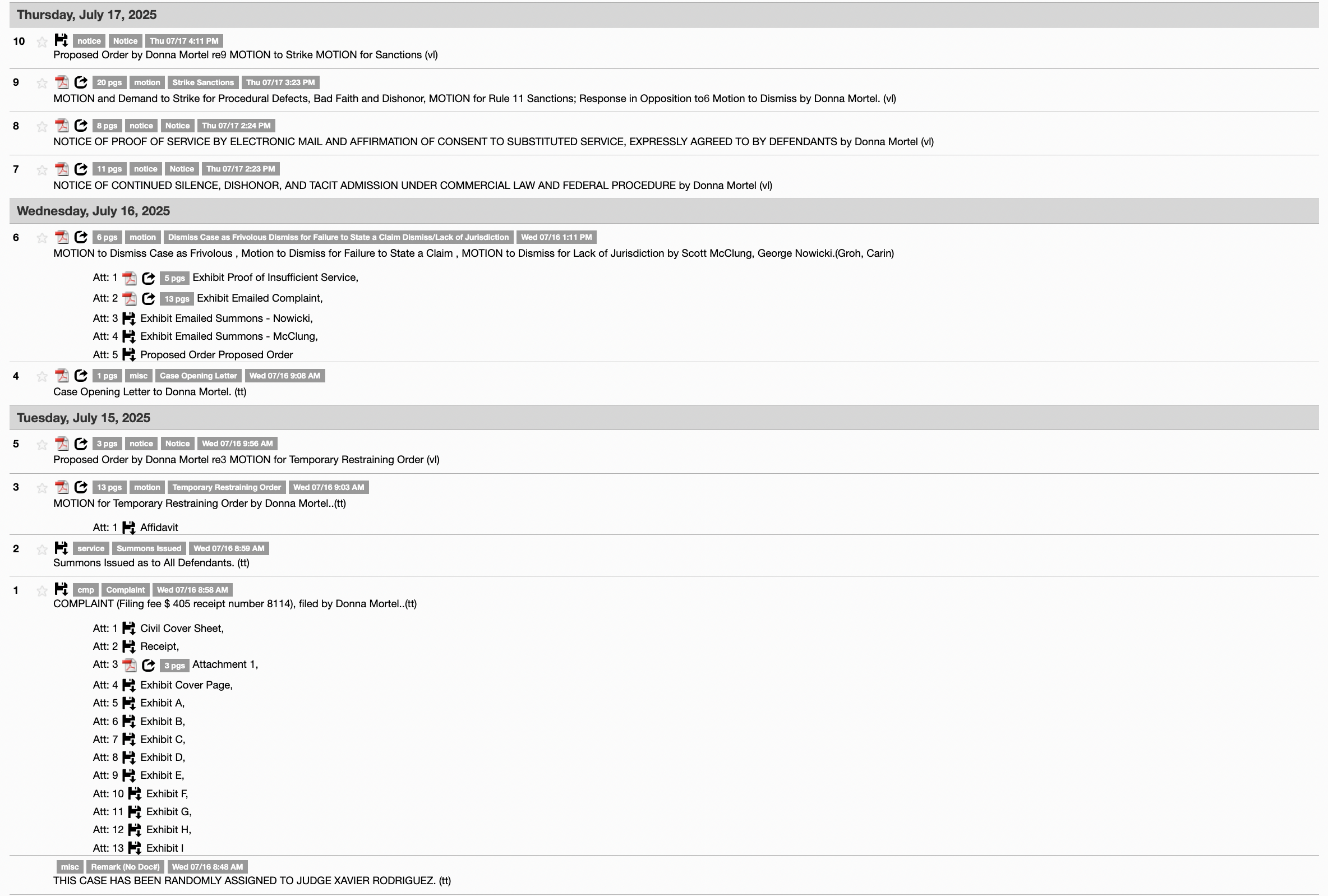
The misconduct rises beyond civil error into the realm of criminal conspiracy:
18 U.S.C. § 242 — Deprivation of rights under color of law
18 U.S.C. § 371 — Conspiracy to defraud the United States
18 U.S.C. § 1962(d) — RICO conspiracy to obstruct justice and deprive lawful property rights
28 U.S.C. § 455 — Disqualification for bias, prejudice, or interest
By aiding and abetting the submission of knowingly false procedural filings, concealing access to public court records, and refusing to adjudicate verified evidence and unrebutted affidavits, Judge Rodriguez and Attorney Silberman have formed the nucleus of a civil conspiracy to obstruct justice, protect financial defendants from liability, and strip a private litigant of access to equity, remedy, and due process.
This is not a clerical error. This is systemic judicial corruption—and it must be called what it is: fraud, collusion, and abuse of public office.
THE RESPONSE: ASSERTION OF REMEDY AND FEDERAL ESCALATION
In response to this blatant judicial fraud and procedural conspiracy, Plaintiff has filed a Verified Motion to Vacate the Void Final Judgment under Federal Rule of Civil Procedure 60(b)(4) — invoking the Court’s non-discretionary duty to set aside a judgment rendered without jurisdiction or due process.
Plaintiff now declares the following course of immediate and escalated remedy:
-
Filing of an Emergency Petition for Writ of Mandamus in the U.S. Court of Appeals for the Fifth Circuit, to compel enforcement of jurisdictional requirements, Rule 60(b)(4) mandates, and constitutional due process where the district court has willfully refused to act.
“Mandamus is appropriate when the trial court has refused to exercise its jurisdiction, or when its action is a usurpation of judicial power.”
— In re Lloyd’s Register N. Am., Inc., 780 F.3d 283, 290 (5th Cir. 2015) -
Commencement of a federal civil action in the U.S. District Court for the District of Columbia under:
-
42 U.S.C. § 1983 — for deprivation of rights under color of law;
-
18 U.S.C. § 1962 — civil RICO claims for collusion, obstruction of justice, and judicial conspiracy;
-
Bivens v. Six Unknown Named Agents, 403 U.S. 388 (1971) — to hold federal actors individually liable for constitutional violations.
-
-
Pursuit of permanent injunctive relief, declaratory judgment, and compensatory and punitive damages for the unlawful deprivation of remedy, reputational harm, commercial interference, and trauma inflicted by this judicial misconduct.
-
Filing of judicial misconduct complaints and disqualification demands under 28 U.S.C. § 351 and § 455, to initiate investigation and disciplinary action against Judge Xavier Rodriguez for:
-
Failure to adjudicate jurisdiction;
-
Collusion with defense counsel Carin Silberman of the Silberman Law Firm;
-
Fabrication of false procedural grounds for dismissal;
-
Obstruction of equity and denial of constitutional rights.
-
CONCLUSION: COLLUSION EXPOSED — CONSTITUTION BETRAYED
What has transpired in this case is not mere error — it is a deliberate abuse of judicial office, a calculated obstruction of justice, and a direct betrayal of the Constitution. By knowingly ignoring subject-matter jurisdiction, suppressing unrebutted affidavits, and colluding with defense counsel to fabricate a Rule 41(b) dismissal, Judge Xavier Rodriguez and Attorney Carin Silberman have crossed the line from negligence into willful misconduct and fraud upon the court.
“Judges are not immune from liability for acts that are not judicial in nature or are taken in the complete absence of all jurisdiction.”
— Stump v. Sparkman, 435 U.S. 349, 356–57 (1978)
Their actions do not merely violate procedure — they subvert the very foundation of lawful adjudication and openly defy Article III judicial duty. This conduct constitutes civil rights violations under 42 U.S.C. § 1983, fraud under 18 U.S.C. § 1341, and predicate acts under RICO, 18 U.S.C. § 1962.
Let this stand as a formal declaration:
The judiciary is not above the law. The Constitution is not optional.
And when public officials weaponize the bench to silence litigants, shield private defendants, and suppress equitable remedy, they cease to be neutral arbiters — they become co-conspirators in fraud and oppression.
The People are watching.
The record is preserved.
And this betrayal will not go unanswered.
